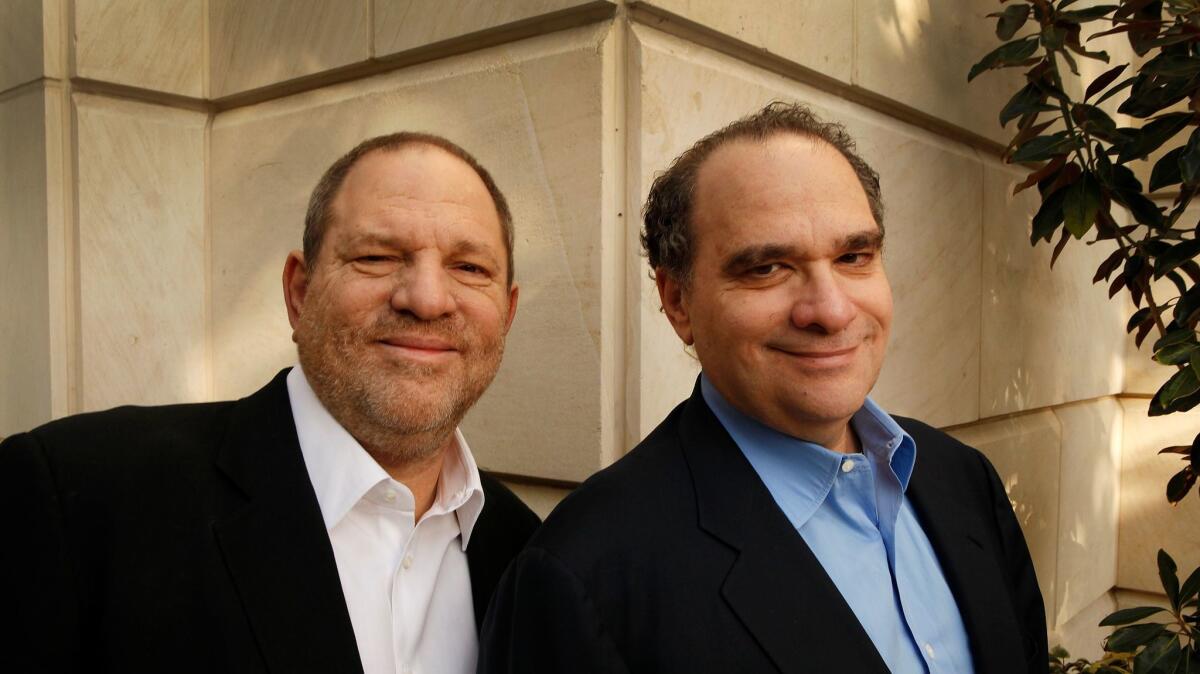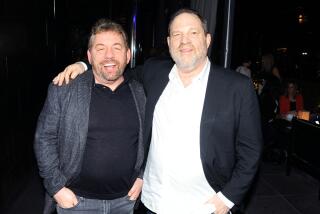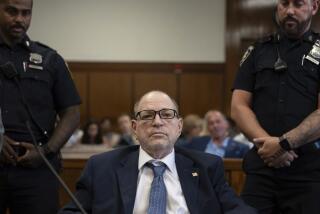It was Bob and Harvey Weinstein against the world. Then they turned on each other.

For the Weinsteins, it had always been Bob and Harvey against the world.
In 1979, the twenty-something rock promoters brought their unpolished demeanor, fast-talking style, and rough negotiating tactics to the movie business, naming their new film production company after their parents, Miriam and Max.
Together, they built a studio that would redefine independent cinema by drawing upon their complementary skills. Though they became famous for their conference room shouting matches, the brothers from Queens, N.Y., always managed to put their differences aside when facing common enemies.
But their escalating tensions finally burst into the open this month amid allegations that Harvey Weinstein sexually harassed or assaulted more than 40 women over two decades.
Now, the alleged misconduct threatens to take down everything they’ve built. Although Bob Weinstein said he took steps in recent years to distance himself from his disgraced brother, their fates may be intertwined. Some people close to the company say it will be difficult for Bob Weinstein to retain a leadership role in the Weinstein Co. — if it survives at all. And the Weinstein name may be forever tainted, making it difficult for him to start fresh in Hollywood.
“The question is going to be are people going to be willing to work with a company that either of the Weinstein brothers is involved with?” said Joe Pichirallo, a film professor at NYU Tisch School of the Arts who competed with the Weinsteins as a Fox Searchlight executive.
The stunning events have cast Bob Weinstein, 63, in an unfamiliar position. After spending decades playing a supporting role to his bombastic brother, he now finds himself in the spotlight as he tries to save the company he co-founded in 2005. Last week, he publicly condemned his brother’s behavior and called for his ouster from the film academy.
The New York Times and the New Yorker first reported the explosive sexual misconduct allegations against Harvey Weinstein, 65. Since those reports earlier this month, police in New York and London have begun investigating some of the claims. Harvey Weinstein has denied allegations of nonconsensual sex.
Although Bob Weinstein told the Hollywood Reporter he was unaware of the “type of predator that [Harvey] was,” some former employees and associates expressed skepticism, noting their closeness and Bob Weinstein’s familiarity with the company’s business dealings.
The younger Weinstein declined to be interviewed. “There are a lot of moving pieces right now that need to responsibly come to rest and my only course of action at this time is to preserve and protect the current stakeholders, talent, shareholders, creditors including potential claimants and employees,” he said in a statement.
Already, Bob Weinstein is facing opposition. Last Friday, he declared the mini-studio wasn’t for sale. That was contradicted days later, when the company announced it was in talks to sell all or part of its business to Thomas Barrack’s private equity firm Colony Capital.
What’s more, Bob Weinstein is confronting an allegation of inappropriate behavior. Showrunner Amanda Segel, who worked on the Weinstein Co.’s Spike TV show “The Mist,” said the executive repeatedly made unwanted romantic overtures to her beginning last year, according to Variety. A Weinstein representative called Segel’s assertions “false and misleading.”
Not everyone is counting Bob Weinstein out. Some experts think he can continue to run the Dimension label known for action and horror movies, or launch a new brand.
“He’s going to have to take a hit, but I think Bob will continue to be a force within the industry,” said Wheeler Winston Dixon, a film professor and indie movie expert at the University of Nebraska, Lincoln.
But going forward, he won’t have the complementary skills of his brother.
They transformed Miramax into an indie film powerhouse known for such hits as the Oscar-winning “Shakespeare in Love” and “Pulp Fiction.”
Harvey was the flashy mogul, tirelessly working the awards campaign trail, schmoozing at parties and attending premieres. Bob stayed in the background, going over marketing materials in the office while his brother charmed the Hollywood bigwigs. While Harvey’s first love was art-house fare, Bob took to more commercial, low-brow movies.
“Bob had his own skill set,” said Bill Mechanic, a movie producer and former studio executive who worked with the brothers after they joined Disney. “He was making movies he liked. They were rougher, they were horror action pictures. He had a more commercial sensibility.”
Like Harvey, he’s known to be volatile, and people who worked with him described him as just as much of a bully, though without his brother’s charisma.
“Bob was the one [of the brothers] that was actually scarier — he was much less predictable,” said Mark Tusk, former vice president of acquisitions at Miramax, who worked there during the 1990s.
Though less explosive than Harvey, he could be difficult with filmmakers, relentlessly pressuring producers when hashing out deal terms. He and Harvey were known to keep a movie from going into wide release and holding back advertising funds until the producers would give them a better price.
After they sold Miramax to the Walt Disney Co. in 1993, Bob Weinstein led the Dimension label through a remarkable period of successful low-budget movies, including the “Scream” franchise. In 2000, Dimension accounted for three-quarters of Miramax’s profits, the Los Angeles Times reported. Dimension catapulted Bob Weinstein from under his brother’s shadow and gave Harvey Weinstein the financial cover to chase Oscars.
Miramax, meanwhile, suffered a string of flops, which led to an acrimonious split with Disney in 2005. They launched the Weinstein Co. that same year, relishing their newfound independence.
“They were closer at that point because they were creating their own thing,” said Brendan Deneen, who was an executive for the Weinsteins from 2003 to 2007.
Weinstein Co. had back-to-back best picture Oscars with “The King’s Speech” in 2011 and “The Artist” in 2012. But the studio struggled without Disney’s deep pockets.
Tensions rose as Dimension landed fewer recent hits, other than the computer-animated hybrid “Paddington.” As flops such as “Apollo 18” and “Sin City: A Dame to Kill For” piled up, Harvey belittled Bob to the board, according to people close to the studio. Bob had his own ammunition: Harvey had tried to expand into other businesses, including fashion, with little success.
Their relationship continued to sour. About six years ago, Harvey punched Bob in the face during a meeting, according to people who saw the encounter.
“For the last five years, I’ve probably talked to my brother 10 times on any personal level,” he told the Hollywood Reporter in an interview published Saturday. “Do you know how disgusted I am? I divorced my brother five years ago. Literally. And those that know me personally in this company understood how I could not take being around him on any level.”
Two people close to the studio said the only thing that kept the brothers from open warfare was the fact that their mother Miriam was still alive. She died last year at the age of 90.
The brothers privately clashed again this year when Harvey resisted releasing a low-budget horror movie called “Polaroid,” which Bob had championed, according to a person familiar with their relationship. And Bob strongly advised Harvey not to back “Tulip Fever,” a historical drama about a Dutch commodities craze that bombed at the box office.
As they challenged each other over business decisions, Bob Weinstein was also growing increasingly frustrated with Harvey’s treatment of women. He played a direct role in bringing the Weinstein Co. board of directors’ attention to a 2015 memo from employee Lauren O’Connor that accused Weinstein of sexual harassment, according to two people familiar with the matter who were not authorized to comment.
Bob insisted Harvey accept terms in his new contract that allowed him to be terminated for misconduct, these people said. That new contract gave the board the authority to terminate him last week as the allegations multiplied.
Even before the scandal, the Weinstein brothers’ days as indie juggernauts had already long passed.
The studio was already struggling with fewer releases and hit movies. And now, Harvey Weinstein’s departure leaves the company without its visionary.
“Harvey was the glue that held it together,” said NYU’s Pichirallo. “It’s hard to see how they’ll go back to that without some miracle happening.”
Twitter: @rfaughnder
Los Angeles Times staff writer David Ng contributed to this report.
More to Read
Sign up for Essential California
The most important California stories and recommendations in your inbox every morning.
You may occasionally receive promotional content from the Los Angeles Times.











